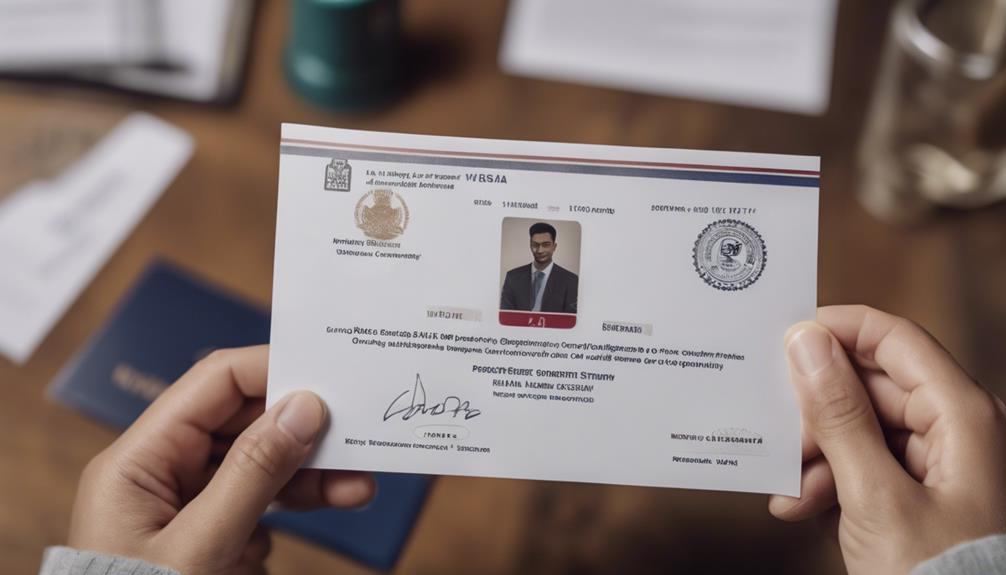If you've ever pondered the intricate web of US immigration laws and the startup visas designed for non-residents, you're not alone.
Venture into the realm of possibilities where innovation meets regulation, and where entrepreneurial dreams can find a home in the land of opportunity.
The journey to understanding these laws and visas holds the key to unlocking a world of potential for those seeking to plant their business roots in the United States.
Key Takeaways
- Startup visas like E-2, EB-5, L-1, and O-1 enable non-residents to pursue entrepreneurial ventures in the US.
- Compliance with visa regulations is essential for maintaining legal status and ensuring a strong foundation for startups.
- Understanding eligibility criteria, application processes, and investment requirements is crucial for successful visa applications.
- Documentation, employee sponsorship, and visa renewal processes are key aspects for non-residents navigating US immigration laws and startup visas.
US Immigration Laws Overview
When considering the landscape of US immigration laws, it's vital for non-residents to grasp the intricacies that govern their entry, stay, and ability to work within the United States. Navigating the visa process as an entrepreneur requires a solid understanding of the various options available under US immigration laws. Startup visas such as the E-2, EB-5, L-1, and O-1 visas offer tailored pathways for non-residents looking to establish businesses in the US. These visas cater to different needs and requirements, providing flexibility for entrepreneurs with diverse business goals.
Compliance with US immigration laws is paramount for non-residents aiming to start and operate successful ventures in the country. Understanding the nuances of visa regulations, maintaining legal status, and fulfilling any necessary obligations are crucial steps in ensuring a smooth and lawful entrepreneurial journey in the United States. By adhering to the guidelines set forth by US immigration laws, non-residents can establish a solid foundation for their startups and contribute meaningfully to the vibrant business landscape of the country.
Types of Startup Visas Available

Explore the diverse array of startup visas available to non-residents seeking to establish businesses in the United States. These visas offer unique pathways for entrepreneurs to contribute to the U.S. economy and society:
- E2 Visa**: Secure your future in the U.S. with a substantial investment in a business.
- EB-5 Visa: Invest in a new commercial enterprise and create jobs for American workers while obtaining a green card.
- L1 Visa: Transfer your expertise as a manager or executive to a U.S. affiliate through a qualifying relationship.
- EB1C Visa: Join a U.S. affiliate as a manager or executive with a proven operational history and qualifying relationship.
- International Entrepreneur Rule**: Embrace the opportunity for growth and job creation in the U.S. as an international entrepreneur.
These visa options cater to non-residents looking to make a mark in the U.S. business landscape, offering avenues for investment, job creation, and professional growth. Each visa type presents a unique opportunity for individuals to thrive and contribute to the vibrant entrepreneurial ecosystem of the United States.
Eligibility Criteria for Startup Visas
To qualify for a startup visa, applicants must demonstrate substantial ownership (minimum 10%) in the startup entity. The startup entity must be a U.S. business formed within 5 years to be eligible for the visa. Additionally, there are specific funding requirements that must be met, including a qualified investment amount of $264,147 or a qualified award/grant amount of $105,659. Qualified investors who can provide funding for the startup need to be U.S. citizens or lawful permanent residents with a track record of investing in start-up entities with growth potential.
| Eligibility Criteria | Details |
|---|---|
| Substantial Ownership | Minimum 10% ownership in the startup entity |
| U.S. Business Entity | Must be formed within 5 years |
| Funding Requirements | Qualified investment of $264,147 or award of $105,659 |
| Qualified Investors | Must be U.S. citizens or lawful permanent residents with a track record of investing in entities with growth potential |
Application Process for Non-Residents

As you move forward with your application for a startup visa as a non-resident, understanding the intricacies of the application process set by the USCIS is crucial for a successful outcome.
Here are some important points to consider:
- Meeting specific criteria set by the USCIS is fundamental for a successful application.
- Demonstrating eligibility through thorough documentation and evidence is key.
- Be prepared for varying application processing times based on visa type and individual circumstances.
- Ensure all required forms are accurately completed and submitted with necessary supporting materials.
- Understanding the application process is essential for navigating the complexities of US immigration laws related to startup visas.
Investment Requirements for Visas

To secure various US visas, you must meet specific financial thresholds and capital investment criteria. Whether aiming for an E2 Visa, EB-5 Visa, L1 Visa, EB1C Visa, or considering the International Entrepreneur Rule, understanding the investment requirements is crucial.
These requirements are designed to ensure that your investment contributes to the growth of the US economy and creates job opportunities for American workers.
Financial Thresholds for Visas
For those considering US immigration through startup visas, understanding the financial thresholds for each visa category is crucial to making informed investment decisions in your entrepreneurial journey.
When exploring the financial requirements for visas like the E-2, EB-5, L-1, EB-1C, and the International Entrepreneur Rule, keep in mind the following key points:
- The E-2 Visa demands a substantial investment in a US company.
- The EB-5 Visa necessitates a minimum investment of $500,000 in a new commercial enterprise.
- The L-1 Visa allows the transfer of managers or executives with a qualifying relationship.
- The EB-1C Visa caters to transferring managers or executives to a US affiliate with prior work experience.
- The International Entrepreneur Rule offers temporary living and working opportunities for entrepreneurs showcasing significant public benefit through business growth.
Capital Investment Criteria
Considering the visa application process for US immigration, understanding the capital investment criteria is essential for aspiring entrepreneurs. Different visa categories have specific investment requirements that applicants must meet to qualify for entry into the United States. Below is a breakdown of the investment criteria for various visas:
| Visa Type | Investment Requirement |
|---|---|
| E-2 Visa | Substantial investment in a US company from treaty countries |
| EB-5 Visa | Minimum investment of $500,000 in a new commercial enterprise |
| L-1 Visa | Facilitates the transfer of managers or executives to US affiliates |
| EB-1C Visa | Allows the transfer of managers or executives with specific experience |
| Intl. Entrepreneur Rule | Grants authorized stay for entrepreneurs showing public benefit through business growth |
Understanding these investment criteria is crucial for navigating the visa application process effectively.
Bringing Employees to the US

When bringing employees to the US, you should be aware of the visa sponsorship process, the employment eligibility criteria, and the documentation requirements.
Understanding these key points will help you navigate the process smoothly and ensure compliance with US immigration laws.
Visa Sponsorship Process
To efficiently bring employees to the US through visa sponsorship, US companies must navigate the intricacies of immigration laws governing intracompany transfers. When engaging in the visa sponsorship process, consider the following:
- Compliance: Ensure adherence to immigration laws.
- Duration: Understand the length of stay permitted under specific visa categories.
- Path to Residency: Explore avenues for obtaining permanent resident status for certain employees.
- Treaty Benefits: Utilize visa categories for treaty traders and investors to employ individuals of the same nationality.
- Ownership Impact: Evaluate the effects on visa status when dealing with ownership and investment interests in a company sponsored under specific visas.
Understanding these aspects is crucial for a successful visa sponsorship process.
Employment Eligibility Criteria
Navigating the intricacies of US immigration laws when bringing employees to the US for new ventures requires careful consideration of the employment eligibility criteria set forth by the government. As entrepreneurs or business owners, it's crucial to ensure compliance with immigration laws, especially when hiring non-residents to work in the US.
Whether you're looking to bring in executives, managers, or other key staff members, understanding the regulations surrounding startup visas is essential. By adhering to the documentation requirements and regulations set by the government, you can streamline the process of bringing employees to the US.
Ensuring that all employment criteria are met won't only facilitate the visa application process but also demonstrate your commitment to operating within the boundaries of US immigration laws.
Documentation Requirements
Meeting the documentation requirements is essential when bringing employees to the US for new ventures. To ensure a smooth process and compliance with immigration laws, here are some crucial points to consider:
- Detailed Job Descriptions: Provide clear job roles and responsibilities for each employee.
- Valid Employment Contracts: Ensure all contracts are up to date and accurately reflect the terms of employment.
- Proof of Business Need: Demonstrate the necessity of hiring non-residents for specific roles within the US company.
- Documentation for Visa Applications: Gather all necessary paperwork for visa applications, including forms, supporting documents, and fees.
- Legal Consultation: Seek guidance from immigration experts to navigate the intricacies of bringing intracompany transferees, executives, managers, treaty traders, or treaty investors to the US.
Selling a Company Established With Visa

When considering selling a company established with a Treaty Trader/Investor visa, it's crucial to understand how the ownership transfer may impact your visa status. The nationality ownership requirements associated with the Treaty Trader/Investor visa mean that changing ownership to individuals of different nationalities can affect your eligibility for E visa status.
However, if you opt for partial interest sales, your E visa status can be maintained as long as the substantial investment interest remains intact. It's important to note that the maintenance of your E visa status heavily relies on the size of your investment compared to the total value of the company.
Ensuring that your investment remains substantial relative to the overall company value is essential for safeguarding your E visa status eligibility. Therefore, when contemplating the sale of a company established under a Treaty Trader/Investor visa, carefully consider how the transaction may impact your visa standing and take steps to preserve your E visa status.
Renewal and Extension of Visas

As you continue to build and expand your business established under a Treaty Trader/Investor visa, ensuring the timely renewal and extension of your visa, such as the E-2 and L-1 visas, is vital for maintaining your legal status and sustaining your entrepreneurial activities in the US. Renewal and extension processes for visas play a crucial role in supporting entrepreneurs and executives in continuing their business operations and growth within the country.
- Renewal of visas: Allows for uninterrupted business activities and legal compliance.
- Extensions provide flexibility: Enabling entrepreneurs and executives to further establish and grow their businesses.
- O-1 visa extensions: Facilitate the continuation of extraordinary work in specific fields.
- Maintaining legal status: Essential for peace of mind and ongoing business operations.
- Sustaining business activities: Ensures continuity and growth within the US market.
Understanding the renewal and extension procedures for visas like E-2, L-1, and O-1 is key to safeguarding your entrepreneurial journey and maintaining a stable presence in the US.
Compliance With US Immigration Regulations

Ensuring strict compliance with US immigration regulations is imperative for entrepreneurs navigating visa requirements to avoid legal complications or jeopardizing their lawful status in the country. Adhering to the specific visa guidelines is crucial as violations can result in severe consequences such as visa revocation, inadmissibility, or even deportation. It's essential for entrepreneurs to understand the rules and regulations governing immigration to maintain their lawful status in the US successfully.
Consulting with an immigration attorney can greatly assist entrepreneurs in navigating the complex landscape of US immigration laws. These legal experts can provide valuable guidance on how to comply with the regulations, ensuring that entrepreneurs meet all visa requirements and avoid potential legal issues. By seeking the assistance of an immigration attorney, entrepreneurs can proactively address any concerns regarding compliance and safeguard their lawful status in the United States. Remember, staying informed and following the immigration regulations diligently is key to a successful and legally sound entrepreneurial journey in the US.
Conclusion
So, now that you've navigated the maze of US immigration laws and startup visas for non-residents, you're basically a legal wizard. Just remember, when dealing with government bureaucracy, patience is key (or maybe a magic wand).
Keep those investment dollars flowing, create those jobs, and remember to renew those visas on time. And hey, if all else fails, there's always the option of selling your company and starting fresh.
Good luck, oh wise entrepreneur!